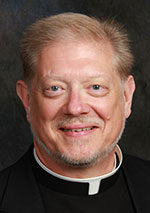That All May Be One / Fr. Rick Ginther
Catholic-Methodist dialogue builds bridges of faith
 Indiana is the home of Roman Catholics and Methodists.
Indiana is the home of Roman Catholics and Methodists.
Roman Catholics arrived with the French colonists in the late 17th century. The first city established was Vincennes in 1732.
Methodists first established themselves in Clark County in 1801.
Both denominations were initially served by circuit riders. Small communities of believers received their respective clergy from time to time. Often the circuit riders traveled hundreds of miles.
Eventually, both grew to build churches—first log cabins, then white clapboard churches, and finally large, cathedral-like stone and brick structures. Both established hospitals and orphanages, even as Catholic schools spread throughout the state.
While the Roman Catholic Church remained united, Methodists went through a lengthy period of divisions beginning in 1816. They returned for the most part to being one church (United Methodist) in 1968.
In 2019, the United Methodists in Indiana had 1,100 churches and 240,000 members.
Figures from 2020 reveal approximately 1.2 million Catholics in Indiana. The number of parishes is in flux.
Until the early 1960’s, our international, national and local history was marked by mutual distrust and polemics. World War II began to ameliorate this. The Second Vatican Council offered us another way of relating to each other.
In 1966, the United Methodist-Catholic Dialogue was established in the United States.
Select scholars, pastors and lay members, guided by bishops from each denomination, have gathered typically semi-annually.
Through the years, those gathered have discussed a wide range of issues, from education to ordained ministry to the Eucharist.
To date, there have been eight rounds of discussions. Each round has resulted in a joint statement and, in some cases, a joint publication to be shared.
In 2006, United Methodists signed the Catholic-Lutheran Joint Declaration of Justification. This agreement set aside the centuries-old disagreement on how people are made just before God.
Flowing from this newfound unity was round seven of the dialogue (from the fall of 2008 to the summer of 2011). The dialogue partners explored a major issue affecting the common good: environmental stewardship.
The result was the document “Heaven and Earth are Full of Your Glory.” Its unique perspective was the Eucharist.
Noting that elements of nature (grain/grapes) are essential to the Eucharist, an intimate theological connection emerged.
“We call both Methodists and Catholics to participate more deeply in the Eucharist by recognizing its intrinsic connection with the renewal of creation,” wrote the two bishops who oversaw round seven.
Round eight explored areas of convergence and divergence for Methodists and Catholics. Our mutual recognition of one another’s baptism was the lens for the dialogue.
The Apostles’ Creed, the Lord’s Prayer, and the Ten Commandments were recognized as touchstones for baptismal preparation. Emerging in 2020 were two documents.
The first was a teaching document: “Catholic and United Methodists Together: We Believe, We Pray, We Act.”
The second was a pastoral document: “Catholic and United Methodists Together: Shared Prayers and Resources.” This document lays out common prayers and worship practices and services that Catholics and Methodists may use together. Blended Catholic/Methodist families were also a focus.
Whether in Indiana or throughout the United States, a growing sense of moving toward unity among Catholics and Methodists has emerged these past 55 years. I hope that our parishes in the archdiocese will form closer bonds with our Methodists neighbors.
For further consideration of the reality and results of this Dialogue, go to cutt.ly/Catholic-Methodist (case sensitive). For some historical insights, go to www.inumc.org, the home page of the Indiana United Methodist Church.
(Father Rick Ginther is director of the archdiocesan Office of Ecumenism and Interreligious Affairs. He is also the pastor of Our Lady of Lourdes Parish, Indianapolis.) †
 Indiana is the home of Roman Catholics and Methodists.
Indiana is the home of Roman Catholics and Methodists.